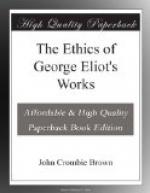In poetry, the key-note so firmly struck by Wordsworth in his noble “Ode to Duty” has been as firmly and more delicately caught up by other singers; who, moreover, have seen more clearly than Wordsworth did, that it is for faith, not for sight, that duty wears
“The Godhead’s most benignant grace;”
for the path along which she leads is inevitably on earth steep, rugged, and toilsome. Take almost any one of Tennyson’s more serious poems, and it will be found pervaded by the thought of life as to be fulfilled and perfected only through moral endurance and struggle. “Ulysses” is no restless aimless wanderer; he is driven forth from inaction and security by that necessity which impels the higher life, once begun within, to press on toward its perfecting this all-possible sorrow, peril, and fear. “The Lotos-eaters” are no mere legendary myth: they shadow forth what the lower instincts of our humanity are ever urging us all to seek—ease and release from the ceaseless struggle against wrong, the ceaseless straining on toward right. “In Memoriam” is the record of love “making perfect through suffering:” struggling on through the valley of the shadow of death toward the far-off, faith-seen light “behind the veil.” “The Vision of Sin” portrays to us humanity choosing enjoyment as its only aim; and of necessity sinking into degradation so profound, that even the large heart and clear eye of the poet can but breathe out in sad bewilderment, “Is there any hope?”—can but dimly see, far off over the darkness, “God make Himself an awful rose of dawn.” In one of the most profound of all His creations—“The Palace of Art”—we have presented to us the soul surrounding itself with everything fair and glad, and in itself pure, not primarily to the eye, but to the mind: attempting to achieve its destiny and to fulfil its life in the perfections of intellectual beauty and aesthetic delight. But the palace of art, made the palace of the soul, becomes its dungeon-house, self-generating and filling fast with all loathsome and deathly shapes; and the heaven of intellectual joy becomes at last a more penetrative and intenser hell. The “Idylls of the King” are but exquisite variations on the one note—that the only true and high life of humanity is the life of full and free obedience; and that such life on earth becomes of necessity one of struggle, sorrow, outward loss and apparent failure. In “Vivien”—the most remarkable of them all for the subtlety of its conception and the delicacy of its execution,—the picture is perhaps the darkest and saddest time can show—that of a nature rich to the utmost in all lower wisdom of the mind, struggling long and apparently truly against the flesh, yet all the while dallying with the foul temptation, till the flesh prevails; and in a moment, swift and sure as the lightning, moral and spiritual death swoops down, and we see the lost one no more.
Many other illustrations might be given from our noblest and truest poetry—from the works of the Brownings, the “Saints’ Tragedy” of Charles Kingsley, the dramatic poems of Henry Taylor—of the extent to which it is vitally, even where not formally Christian; the extent to which the truth of the Cross has transfused it, and become one chief source of its depth and power. But we must hasten on to our more immediate object in these remarks.




